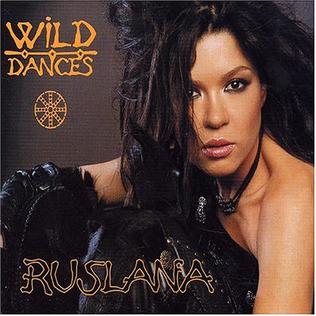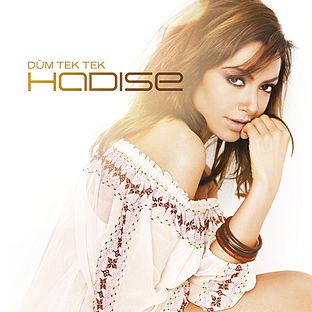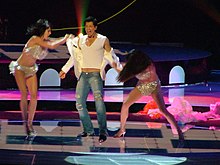
"Wild Dances" is a song composed and recorded by Ukrainian singer-songwriter Ruslana, with lyrics by herself, Oleksandr Ksenofontov, Jamie Maher, Michael Fayne, and Sherena Dugani. It represented Ukraine in the Eurovision Song Contest 2004, held in Istanbul, resulting in the country's first win at the contest.

The Eurovision Song Contest 2006 was the 51st edition of the Eurovision Song Contest. It took place in Athens, Greece, following the country's victory at the 2005 contest with the song "My Number One" by Helena Paparizou. Organised by the European Broadcasting Union (EBU) and host broadcaster Hellenic Broadcasting Corporation (ERT), the contest was held at the Olympic Indoor Hall, and consisted of a semi-final on 18 May, and a final on 20 May 2006. The two live shows were presented by American television personality Maria Menounos and Greek former contestant Sakis Rouvas.

Greece has participated in the Eurovision Song Contest 44 times since its debut in 1974, missing six contests in that time. Greece's first win came in 2005 with "My Number One", sung by Helena Paparizou. The Greek participant broadcaster in the contest is Elliniki Radiofonia Tileorasi (ERT). Greece has never finished last in the contest.
Greece participated in the Eurovision Song Contest 2006, which was held in Athens, Greece following the nation's win at the previous year's contest. The Greek national broadcaster Hellenic Broadcasting Corporation (ERT) internally selected Anna Vissi to represent the country. Her song "Everything" was determined on 14 March 2006 during a four-song national final titled Feel the Party. "Everything" was composed by Nikos Karvelas and written by Vissi.
Greece won the Eurovision Song Contest 2005, its first Eurovision Song Contest victory. Greek national broadcaster Hellenic Broadcasting Corporation (ERT) internally selected Helena Paparizou who sang "My Number One" in Kyiv, winning the competition with 230 points. The song is written by Manos Psaltakis, Christos Dantis and Natalia Germanou. "My Number One" was selected through a national final on 2 March 2005, where the public and a professional jury chose it over three other candidate songs.
Greece competed in the Eurovision Song Contest 2004, held at the Abdi İpekçi Arena in Istanbul, Turkey. The Greek broadcaster Hellenic Broadcasting Corporation (ERT) internally selected Sakis Rouvas with the song "Shake It", written by Nikos Terzis and Nektarios Tyrakis, to represent the nation. Prior to Rouvas' selection, the broadcaster had organised a public selection process entitled Eurostar, consisting of live semi-final heats, leading to a three-participant national final to select their entrant. While the event did take place and Apostolos Psichramis was selected as the Greek entrant, the song selection portion did not materialize after the Rouvas announcement and Psichramis instead joined Rouvas as a backing vocalist.

"Never Let You Go" is a song recorded by Greek singer Mando, with music composed by herself, lyrics written by Teri Siganos, and produced by Johnny Jam. It represented Greece in the Eurovision Song Contest 2003, held in Riga. It was the first entry from Greece in the contest that did not feature any Greek lyrics.
Greece participated in the Eurovision Song Contest 2007 with the song "Yassou Maria", written by Alex Papaconstantinou, Marcus Englöf and Markus Sepehrmanesh. The song was performed by Sarbel. To select their entry for the 2007 contest, which took place in Helsinki, Finland, Greek national television broadcaster Hellenic Broadcasting Corporation (ERT) organised the national final Eurovision 2007 which took place on 28 February 2007. The event saw three acts—Sarbel, Tamta and Christos Dantis—compete to be the Greek representative.

Anastasios "Sakis" Rouvas, also known mononymously as Sakis, is a Greek singer, actor, and businessman.
Greece entered the Eurovision Song Contest 2008 with the song "Secret Combination", written by Konstantinos Pantzis with lyrics by Poseidonas Giannopoulos. The song was performed by Kalomira, an American singer of Greek descent who had previously won a Greek talent show. In February 2008, as part of Ellinikós Telikós 2008, the selection process organized by the Greek national broadcaster Hellenic Broadcasting Corporation (ERT), three competing artists—Chrispa, Kostas Martakis, and Kalomira—performed their prospective entries live during a televised broadcast watched by nearly two million viewers. "Secret Combination" was selected to represent Greece at the Eurovision Song Contest by a combination of a public televote and panel of judges.
Greece participated in the Eurovision Song Contest 2009 with the song "This Is Our Night" written by Dimitris Kontopoulos, Craig Porteils and Cameron Giles-Webb and performed by Sakis Rouvas. To select their entry for the 2009 contest, which was held in Moscow, Russia, the Greek national broadcaster Hellenic Broadcasting Corporation (ERT) internally selected Rouvas, while his song was chosen through the televised national final Ellinikós Telikós 2009, which consisted of three candidate songs voted upon by the public and a jury.

"Düm Tek Tek" is a song by Belgian-Turkish singer Hadise with music composed by Sinan Akçıl and lyrics written by Akçıl, Hadise, and Stefan Fernande. It represented Turkey in the Eurovision Song Contest 2009 held in Moscow.

"This Is Our Night" is a song by Greek singer Sakis Rouvas, from the album Irthes. The song music was composed by Dimitris Kontopoulos and it lyrics were written by Craig Porteils and Cameron Giles-Webb. It represented Greece in the Eurovision Song Contest 2009, held in Moscow.
Greece participated in the Eurovision Song Contest 2010 with the song "Opa", written by Giorgos Alkaios, Giannis Antoniou and Friends Music Factory. The song was performed by Alkaios and Friends. To select their entry for the 2010 contest, which took place in Oslo, Norway, Greek national television broadcaster Hellenic Broadcasting Corporation (ERT) organised the national final Ellinikós Telikós 2010 which took place on 12 March 2010. The event was initially to include 10 songs, however there was one withdrawal and two disqualifications prior to the night of the competition.
Greece participated in the Eurovision Song Contest 2011 with the song "Watch My Dance", written by Giannis Christodoulopoulos and Eleana Vrahali. The song was performed by Loukas Yorkas featuring Stereo Mike. To select their entry for the 2011 contest, which took place in Düsseldorf, Germany, Greek national television broadcaster Hellenic Broadcasting Corporation (ERT) organised the national final Ellinikós Telikós 2011 which took place in March 2011. Six competing acts—Antigoni Psihrami, Kokkina Halia, Yorkas, Nikki Ponte, Trimitonio, and Valando Tryfonos—performed their prospective entries live during the televised event, with the winner selected by a combination of a public televote and a panel of judges.
Greece participated in the Eurovision Song Contest 2012, held in Baku, Azerbaijan. Their selected song "Aphrodisiac" was written by Dimitri Stassos, Mikaela Stenström and Dajana Lööf, and was performed by Eleftheria Eleftheriou, who had previously attempted to represent Greece in the Eurovision Song Contest 2010. The entry was selected through the televised national final Ellinikós Telikós, organised by the country's public broadcasting service Hellenic Broadcasting Corporation (ERT) and held on 12 March 2012 at the River West shopping mall in Athens. Due to the debt crisis facing Greece at the time, the record label of the entry was expected to take on the costs of recording and producing the candidate songs. Universal Music Greece was the only label to accept these terms and put forth four competing acts for consideration. The winning act was selected using a combination of jury and televoting. Following the national final, Eleftheriou embarked on a promotional campaign visiting Turkey and the Netherlands.
Greece participated in the Eurovision Song Contest 2013 with the song "Alcohol Is Free", written by Elias Kozas and Stathis Pahidis. The song was performed by the band Koza Mostra featuring Agathonas Iakovidis. The entry for the 2013 contest, which took place in Malmö, Sweden, was selected through a four-participant national final entitled Eurosong 2013 – a MAD show. Due to budget cuts facing the Hellenic Broadcasting Corporation (ERT) at the time, the selection process was a organised by a private music channel, MAD TV.
Greece participated in the Eurovision Song Contest 2016 with the song "Utopian Land" written by Vladimiros Sofianidis and performed by the band Argo. The song was internally selected by the Greek broadcaster Hellenic Broadcasting Corporation (ERT) to represent Greece at the 2016 contest in Stockholm, Sweden. Argo were announced as the Greek representatives in February 2016, a month before their song "Utopian Land" was presented.
Greece participated in the Eurovision Song Contest 2017 with the song "This Is Love" written by Dimitris Kontopoulos, Romy Papadea and John Ballard. The song was performed by Demy, who was internally selected by the Greek broadcaster Hellenic Broadcasting Corporation (ERT) to represent Greece at the 2017 contest in Kyiv, Ukraine. Demy was announced at the Greek representative on 13 January 2017, while a national final was held in order to select the song she would perform. Three songs competed in the national final on 6 March 2017 and a combination of international jury voting and public voting selected "This Is Love" as the winning song.
Greece participated in the Eurovision Song Contest 2018 with the song "Oniro mou" written by Aris Kalimeris, Dimitris Stamatiou, Yianna Terzi and Mihalis Papathanasiou and performed by Terzi. A national final was scheduled to be held in order to select the Greek entry for the 2018 contest in Lisbon, Portugal. Five entries were to compete in the final on 22 February 2018 where public voting would exclusively select the winner, however "Oniro mou" performed by Terzi was announced as the Greek entry on 16 February 2018 following the disqualification of four out of the five national final entries.








